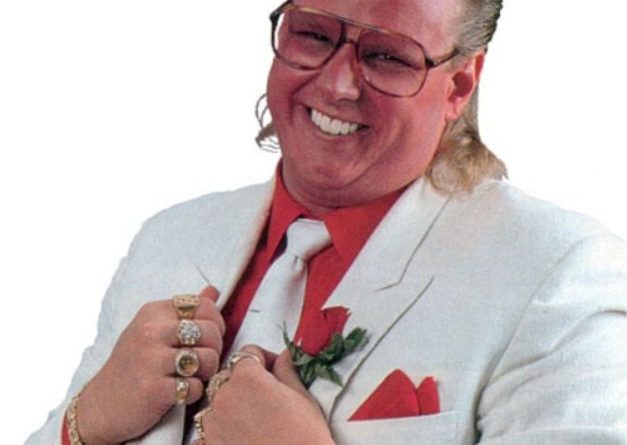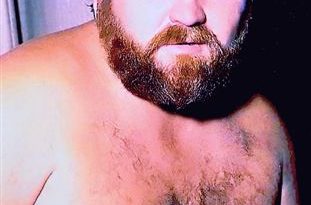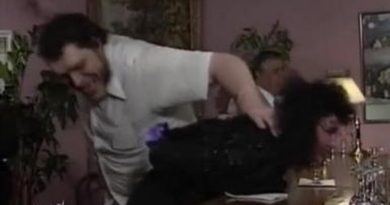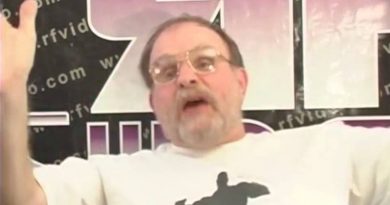Dusty Rhodes Less Famous Than Brother Love
Date: June 18, 1989
Location: New Jersey Turnpike
Source: Something to Wrestle podcast with Bruce Prichard
Dusty Rhodes is one of the most famous pro wrestlers of all-time. But apparently he’s not quite as famous as he thinks he is.
Bruce Prichard, who played the role of Brother Love in the WWF from 1988 to 1991, worked as an assistant to Vince McMahon throughout his years with the WWF. He’s one of the few men who were right there during the WWF’s heyday in the ‘80s and also in the late ‘90s during the Monday night wars era. He knows a lot of the real stories behind some of the most famous moments, characters, and matches in company history.
When Dusty first came to the WWF, Prichard was his travel partner on the road. Prichard claims that despite what many people think, the polka dots were not a rib on Dusty, and neither was his manager, Sapphire. Vince envisioned polka dots on Dusty for some reason, and even when Dusty approached him about getting into better shape, Vince told him not to because being overweight was his character. Vince had respect for Dusty, and when he was offered his old booking job in WCW in 1991, Vince not only let him take it, he also allowed him to bring his son Dustin with him (Dustin had just started with the WWF and the two teamed together at Royal Rumble ’91).
On Dusty’s first house show run in the Northeast in June ‘89, Prichard told him that he’ll soon have more notoriety than he ever dreamed of thanks to now being on WWF television. If you know Dusty’s ego, you know that statement would offend him. And it most certainly did.
Dusty replied, in his classic Dusty accent, “Bruce, I am the second most recognizable athlete in the world, second only to Mohammad Ali.” Prichard said he was willing to bet Hulk Hogan is more recognizable, and of course the claim made by Dusty was ridiculous no matter what outlier poll he was citing. Prichard said he knew it bothered Dusty that he even questioned the accuracy of his statement, which shows just how delusional Dusty was about himself and just how big his ego was.
Prichard pressed on, saying the WWF audience won’t know who he is at first, but they will after he’s on their TV for awhile. Even though Dusty’s claim about himself was absurd, Prichard was almost as absurd in saying nobody in the audience would know who he was. Dusty got over immediately, as he did everywhere else, and plenty of WWF fans knew who he was. As Prichard made his case, Dusty kept insisting he was the world’s second most recognizable athlete. In fact, he said it for four straight days as they rode in the car together on the Northeastern leg of the tour.
Prichard said they ended the tour in Hershey, Pennsylvania (there was another show left in White Plains, but that was a relatively short drive from where Dusty was staying), and then they drove on the New Jersey Turnpike to drop Dusty off at where he was staying in Manhattan, before Prichard went home in Connecticut. They were driving Prichard’s tiny two-seat car, and Prichard was going over 100 miles per hour. Before long, he saw flashing lights and the cops pulled him over.
Prichard said they could either be nice cops or asshole cops. One cop came to each side of the car, and he gave him his license and registration. The cop asked Prichard if he had any idea how fast he was going. Dusty threw him under the bus and said, “Officer, he was doing at least 80 and I told him to slow down!”
The cops walked back to their patrol car, and they were gone for what seemed like forever. There was one problem: Prichard had marijuana in the trunk of his car, not to mention some beer bottles that Dusty had on his side as well. He told Dusty not to mention it, of course. Dusty was at least wise enough to keep quiet about that, and all Prichard could do was hope he just got a speeding ticket and be done with it.
The cops returned on either side of the car and shined their flashlights on them. One cop asked Prichard if they were pro wrestlers. He debated how he should answer them, knowing that the cops could either love wrestling and let them go, or hate them and give the maximum punishment. He decided to say Yes.
The cop freaked out. Even though Prichard had no makeup on and his long hair was a mess, the cop asked him, “Are you Brother Love??” He said Yes. “Oh my God, I knew it! My captain is the biggest wrestling fan! Can I get your autograph??” Prichard obliged, and was relieved.
Meanwhile the other cop shined his light at Dusty and asked, “Are you a wrestler too??”
Of course that didn’t sit well with Dusty’s huge ego. He answered, “I am the American Dream Dusty Rhodes!”
Confused, the cop asked, “Oh, hey, are you still in that AWA??” Dusty was doubly insulted, because not only did he not know who he was, but he also confused the AWA with the NWA.
The cops let them go without a warning, and even told them there are no cops between there and New York, and thus, they could speed if they wanted to. Inside the car, there was dead silence.
Finally after two or three miles, Prichard said, “Second most recognizable athlete in the world, second only to Brother LOOOOOOOVE!”
Prichard got great delight telling that story over the years, especially in the presence of Dusty. And the truth is, in the Northeast, Brother Love in 1989 probably was more recognizable to the average person than Dusty Rhodes was. Of course today, in any part of the world, that would no longer be the case.




